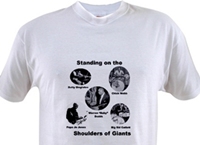
Louis Cottrell, Senior with the Piron's New Orleans Orchestra circa 1923
Baby Dodds is among those who Cottrell influenced (and taught), and Dodds is considered by many to be the root of US drum kit playing. Interestingly, Cottrell was taught by a man named John Kornfeld (see page 2 of Jazz Archivist, May 1997), which probably took place around 1890. Given Cottrell's influence it is possible that he and not Dodds is the true root of US drum kit playing, although it was Dodds who directly influenced the likes of Gene Krupa, Buddy Rich, etc.
Certainly the use of press rolls for time keeping was an innovation, and that technique deserves qualification. Undoubtedly, press rolls were used before Cottrell employed them, but prior to his influencing style, music that was to become jazz was rudimental and precise. Cottrell's press rolls incorporated ragging (syncopation), and was an innovation in the same way as the "push" beat on the bass drum beat, which also originated in early New Orleans music that would become jazz. The push was an extra note on the and of four. One needs to remember that the early New Orleans dance band musicians were also parade musicians and the early parade music was straight, military style. Also, during the formation of what was to become jazz there was a heavy influence of the most popular music of the period, ragtime, which was characterized by syncopated rhythms, as well as the influence of blues. This confluence is covered in Episode One, Gumbo, in Ken Burns' Jazz series.
Examples of Cottrell's playing can be heard on Piron's New Orleans Orchestra . Today the music and drumming sound outdated and corny. However, as subdued as Cottrell's drumming is on that album, you can hear his playing in drummers who he directly influenced, and especially in Happy Goldston's remarkable press rolls. Goldston, born in 1894 was a generation behind Cottrell, but still a part of very early jazz. Here are two brief sound clips of Goldston's press rolls: Li'l Liza Jane and When the Saints Go Marching In.
Putting Cottrell and his contributions and influence into proper context, though, requires an understanding of early jazz itself. A great starting point (if somewhat academic in tone) is How the Creole Band Came to Be By Lawrence Gushee and Harry Carr. This paper provides details on the social fabric in which early Jazz was born, and cites important musicians. Another paper by Lawrence Gushee that attempts to pinpoint the origins is 19th Century Origins of Jazz. Both papers are important to understanding Cottrell's influences. While Cottrell was taught by John Kornfeld, those lessons were probably limited to rudiments that Cottrell later adapted to developing a press roll that had the syncopation and groove necessary to be used for time keeping in the early music.
Additional material for those who are interested in the early forms of jazz, and New Orleans jazz in particular include: Notes from the recording New Orleans Jazz: The Flowering, which is a fascinating history in itself and can be used as a guide to searching for early recordings. An even better resource for seeking the early recordings, though, are A History of New Orleans Music in 100 Tracks - Part 1 and Part 2. This two-part article focuses on the recommended songs to seek out from the New Orleans musicians from 1848 on to fully understand the New Orleans contribution to jazz and the enduring influence of New Orleans musicians who added to it elsewhere.
Additional resources I recommend to anyone interested in the early days of jazz include Hear Me Talkin' to Ya: The Story of Jazz As Told by the Men Who Made It (you can read the first five chapters in An Online Story of Jazz in New Orleans, and two excellent books by Daniel Hardie: The Birth of Jazz: Reviving the Music of the Bolden Era, and the companion, Exploring Early Jazz: The Origins and Evolution of the New Orleans Style. I also recommend Jazz Greats of Old New Orleans, which is a 47 minute video of a television broadcast in 1958 that featured some of the early pioneers who were still alive. Finally, Engine Room: History of Jazz Drumming from Storyville to 52nd Street contains not only excellent examples of early jazz drumming on the first CD of the set, but the remaining three CDs show how jazz and jazz drumming continued to evolve from the influence of the early pioneers to the innovations of those who followed. This is definitely a must have collection for any drummer interested in jazz.


